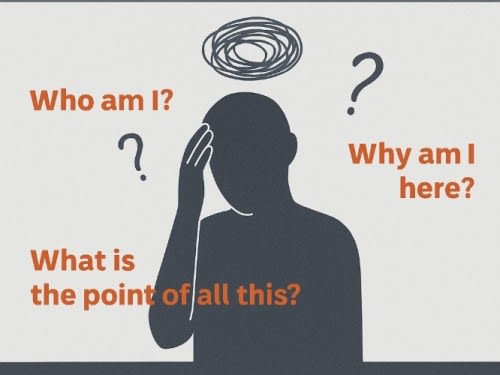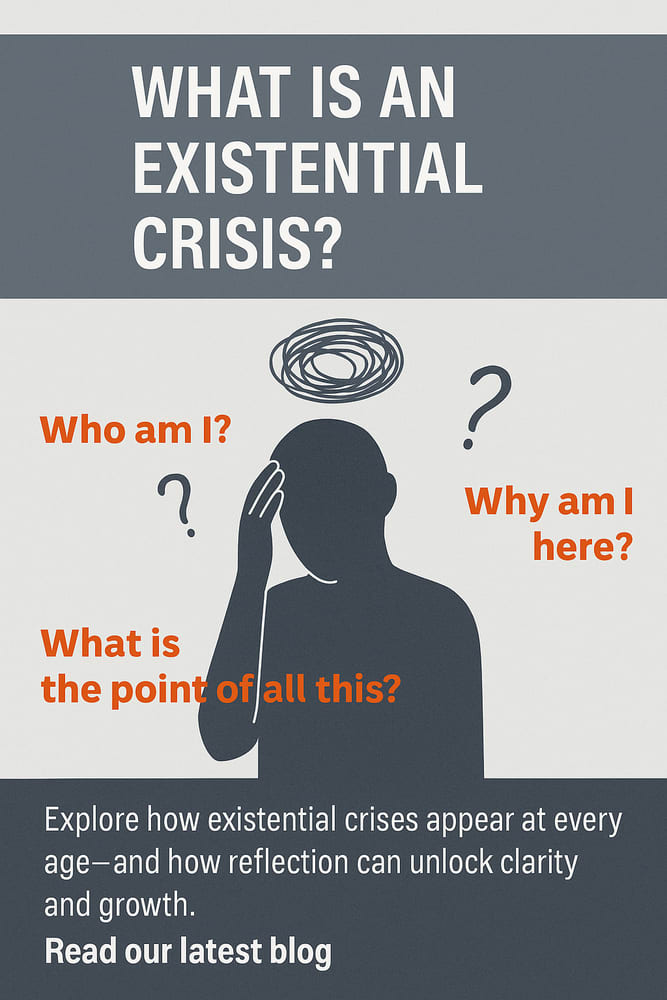What is and Existential Crisis?

posted 11th June 2025

What Is an Existential Crisis? How It Shows Up Across the Lifespan—and What You Can Do About It
An existential crisis isn’t just a fleeting moment of doubt or stress—it’s a deeper confrontation with life’s biggest questions: Who am I? Why am I here? What is the point of all this? These moments of intense reflection can arise at any age, often during major life transitions or in the face of loss, failure, or change. While often uncomfortable, existential crises can also be powerful catalysts for growth and transformation—if we understand what they are, how they affect us at different life stages, and how to navigate them.
What Is an Existential Crisis?
An existential crisis is a period of deep questioning about your purpose, values, identity, and the meaning of life. It's not a mental illness, but it can feel overwhelming and may accompany anxiety, depression, or burnout. Rooted in existential philosophy—from thinkers like Søren Kierkegaard, Jean-Paul Sartre, and Viktor Frankl—it reflects the human tendency to search for meaning and authenticity in the face of life’s uncertainty and mortality.
How It Manifests by Age Group
Teenagers and Young Adults (13–25)
In adolescence and early adulthood, identity formation is key. Existential crises at this stage may emerge as:
Questions about identity: Who am I? Who do I want to become?
Fear of making the wrong choices in education, career, or relationships
Feeling lost or disconnected in a world that feels overwhelming
Middle Age (35–55)
Often labelled the “midlife crisis,” this period can involve:
Reevaluation of life goals
Questions about mortality: Is this all there is?
Burnout or disillusionment with career or relationships
Older Adults and Elderly (65+)
In later life, existential crises often center around legacy, loss, and mortality:
Have I lived a good life?
What will I leave behind?
Should You Ignore an Existential Crisis?
It might feel tempting to push the discomfort aside, hoping it will pass—but ignoring an existential crisis can make things worse.
Why You Shouldn’t Ignore It
Suppressed concerns often resurface, sometimes as anxiety, burnout, or even depression.
Avoidance can leave you feeling stuck, like you’re merely “existing” rather than truly living.
It can block emotional and psychological growth.
Why Facing Your Worries Can Be Helpful
Facing your existential questions doesn’t mean spiraling into despair—it means choosing to engage with your inner life rather than turning away from it.
By allowing yourself to reflect on what matters most, you:
Gain clarity on your values and what brings you fulfillment
Develop resilience in the face of uncertainty and change
Feel more empowered to make meaningful choices
Addressing your worries—gently, intentionally, and with support—often brings relief and a renewed sense of direction. It can also open the door to deeper relationships, more authentic living, and even a spiritual or philosophical awakening.
When It Becomes a Problem
While existential questioning is part of life, it becomes a problem when:
It causes persistent distress or despair
You feel paralysed or unable to function
It results in withdrawal or self-destructive behavior
At this point, seeking professional support is essential.
What You Can Do About It
1. Normalize the Experience
Understand that you’re not alone. Most people, at some point, question their direction or purpose—it’s a sign of consciousness, not weakness.
2. Focus on Meaning, Not Perfection
Instead of trying to “solve” life, look for what gives you meaning—relationships, creativity, service, or spirituality.
3. Reflect Without Judgment
Journaling, therapy, reading, or meditation can help explore your thoughts in a grounded way.
4. Stay Connected
Isolation can magnify existential fear. Talk to people who get it—friends, mentors, or professionals.
5. Seek Professional Support
Existential therapists or psychologists can guide you through your crisis with insight and structure, helping you move from confusion to clarity.
Final Thoughts
An existential crisis can feel like the ground is shifting beneath you—but it can also be the beginning of a more intentional, truthful life. Whether you’re a teen facing the pressure of becoming, a midlife adult reassessing your path, or an elder looking back on your legacy, these crises carry the potential for transformation.
By choosing to face your worries—rather than bury them—you invite growth, peace, and meaning into your life. As Viktor Frankl said, “When we are no longer able to change a situation, we are challenged to change ourselves.”
If you're currently navigating an existential crisis and need a safe space to explore your thoughts, consider speaking with a psychologist trained in meaning-centered therapy. You don’t have to face these questions alone.



